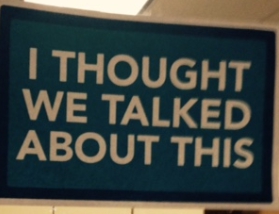
Finding Creative Solutions
March 3, 2015The Use of Reviews
March 5, 2015Cross-Training – A Way To Common Values
I have put a great deal of emphasis on a manager’s ability to identify his or her values and the ability to make judgments about other people’s values as part of the equation of successful organizations. If you have a value problem — which really means that people have different priorities with regard to how they spend their time, how they spend money or how they treat other people — how do you handle the situation?
My experience is that you can help homogenize a group of people’s values with a massive dose of cross-training. In athletics, people have found that if you specialize in only one type of exercise, the muscles required for that exercise get stronger at the expense of other muscles. Great athletes now spend a good deal of time cross-training so that all muscle groups grow together. In that way, the body as a whole gets stronger and more flexible and is better able to withstand injury. I believe that a group’s value system is very similar. If one or two individuals are the only ones who make value decisions about time, money, or personal issues, then the group, like an athlete’s body, becomes very strong and distinct but not flexible, and is prone to more injury and conflicts.
These injuries and conflicts create an increased opportunity for passive resistance to grow, and in the end, the group becomes less productive and unable to grow beyond the one or two people who own the high ground on the value system.
Cross-training is really a very simple discipline of enhancing the empathy and respect of people toward another worker’s point of view. The basic premise is that people who understand the pressures, time constraints, costs and personality styles of others in a work group will have a significantly higher level of empathy for each other. Eventually, they develop a more common value system about spending time, spending money, and how to treat other people.
A word about empathy: I have grown to believe it is the highest human value, outside of love. To have empathy with another human being, one must be able to respect, trust, understand, and intuitively visualize their situation. Empathy is basic to the ability to let another person have a place of dignity in tough situations. It is fundamental to creating win-win situations. It is the foundation of the long-term, thriving relationships essential for successful organizations.
The concept of cross-training is really quite easy to understand so I don’t feel I need to extend the discussion beyond the idea of suggesting some ideas that have worked for me in the past:
The Lunch Presentation
In an organization with many technical components, having a once-a-month lunch where each smaller group presents what they do to the larger group seems to work very well. We used a potluck format and it had major implications for the group dynamics and overall understanding. This technique also serves to involve the entire work group. The lowest salaried people to the highest gain a greater understanding of other workers’ roles and issues.
Management Meetings
Since most management meetings focus on group issues, one idea is to put “managers training” on the agenda each week. Each manager gets a few minutes to explain parts of their organization to the other managers.
Group Training Sessions
Many bottom-line managers question the value of organized training sessions; these cost time and money and show no immediate return on investment. Yet outside training is the best way to bring a longer term focus and supportive work environment to any organization. In most cases the adage that you can lead a horse to water but you can’t make him drink, holds true for any training that you institute, but if it is part of your overall business formula then you never know when you might have a thirsty horse. A consistent training concept gives employees tangible proof that the manager cares about their personal growth. They are also likely to seek help and work through a problem much faster. In addition, these sessions have profound effects on the group’s overall communication and development of common values.
Explaining Why
I believe that when managers make decisions they should spend the time to explain their reasoning to their key subordinates. This is not a justification, but more of a way to let the subordinate start to understand the boss’s value system. These conversations help dispel mistrust and questions and help force the boss to clarify his or her own decision-making process.
It has become obvious to me that the current pace of American business has put pressure on the manager’s ability to incorporate these longer term concepts into one daily management process. Though one could always say “we don’t have time”, one could also say “we can’t afford not to”. If you have a cross-training program in place and value these concepts, I am positive that your organization communicates better, handles problems better and has less passive resistance than work groups that don’t believe in the value of cross-training.






1 Comment
Great article and great seeing you for coffee Monday!
Evie